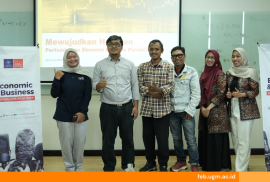The failure of decentralization and regional autonomy have been attributed to the uncertainty of the rules of the game. This will eventually caused the high cost economy for the provision of public services and local economic development.
A number of studies in developed and developing countries showed that decentralization and regional autonomy law have encouraged horizontal accountability. However, this condition also gives opportunities for new channels to practices of power abuse, such as corruption, collusion, nepotism, money politics, lobbying, bribery or gratuities. “In addition, one of the risks of the implementation of this system is the possibility of full control by local elites,” said Prof. Wihana Kirana Jaya, M. Soc, Sc., Ph.D., at the Senate Hall on Thursday (23/12), when inaugurated as Professor of the Faculty of Economics UGM.
Some researchers argue that the failures are due to institutional design that has been built inefficiently. This institutional inefficiency is supposed to be the fundamental cause of economic stagnation in some developing countries and industrialized nations of the past.
“The collapse of the Soviet, Central Asia, and Europe, the Middle East, Latin America and the Caribbean economy are evidence of this case,” said the Vice Dean for Students, Alumni, Cooperation, and Business Development.
Then how about Indonesia? According to Wihana, decentralization and regional autonomy policy, which began in 1974 to 2010, became a phenomena of institutional economy research laboratory that is very dynamic, exciting, and challenging to study. The policy not only has changed the rules of the game very drastically (big bang changes), but also changed the organization, the behavior of players, and human resources.
It is said by Wihana, the changes in decentralization and regional autonomy policies took the form of government change which was formerly very authoritarian to very democratic government. The form of government that used to be extremely centralized became decentralized. “But unfortunately, these rules are not followed by the changes in good governance,” he said.
For the last eleven years, the implementation of decentralization and regional autonomy policy in Indonesia has resulted in positive and negative sides. In addition to increasing transparency, the policy of decentralization and regional autonomy has created opportunities for domination of control by local elites, which eventually produce asymmetric information. “Eventually, this also affects the institutional inefficiency,” he continued.
The husband of dr. Usi Sukorini, M. Kes., Sp.PK (K), assessed the lack of institutional supervision and enforcement became a crucial factor for the stakeholders relationship in decentralization and regional autonomy. The institutional changes in decentralization and regional autonomy have resulted in uncertainty of who has the principal authority and who is given the authority or representative (agent). “It’s because institutional disharmony often happens and creates a bottleneck for the implementation of good governance,” the father of Arya Pradipta, Damas Nawanda, and Dea Karina added.
Source: Agung




